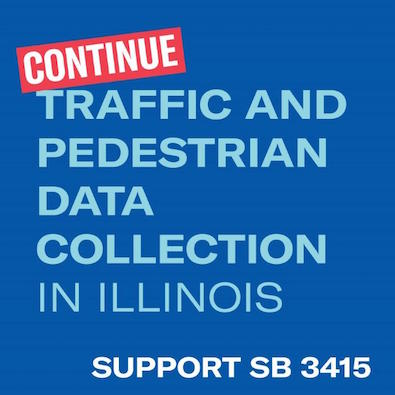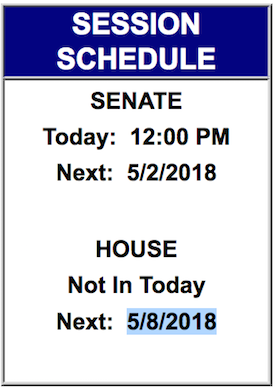* I’m at the Statehouse sitting in committee so I can’t go through it now. Click here to read it and tell us what you see in comments below. Thanks.
20 Comments  
|
* From the Illinois Policy Institute’s former news service…
Do Illinoisans support the idea of higher earners paying more taxes? It seems to depend on how the question is asked.
A poll by the Paul Simon Public Policy Institute at Southern Illinois University showed nearly three-quarters of those asked support a tax that “would be lower for lower-income taxpayers and higher for upper income taxpayers.”
When asked if they would support a tax that “would result in single filers earning over $17,300 to pay more in taxes,” support drops to 14 percent. The Illinois Policy Institute asked that question in a poll in late March and early April.
Jim Long, director of legislative relations for the Chicago-based think tank, said nearly everyone would support a progressive tax without the reality of math.
“It’s like asking a kid if they want ice cream for dinner. Everybody’s going to go for that,” he said. “We put [our poll] through the grinder of economics.”
The institute’s poll used figures based on State Rep. Robert Martwick’s stalled progressive income tax bill. The institute said Illinoisans would see taxes increase from the current 4.95 percent – raised from 3.75 percent last summer – based on a progressive rate of 5.84 percent kicking in at $7,500 in annual earnings.
The Institute loves to pick on Martwick’s bill and only rarely talks about the stuff about lowering property taxes, etc. The bill is dead. He couldn’t even get a single co-sponsor before tabling it last week. It’s not gonna be law.
But the new CTBA graduated tax proposal purports to cut taxes for 98 percent of taxpayers, which I’m betting polls better.
* Even so…
Federal vs. state, but still a decent point.
24 Comments  
|
“Sh-caw-go” is almost no more
Tuesday, May 1, 2018 - Posted by Rich Miller
* Ed McClelland writes in Belt Magazine about the disappearing regional accents among white urban politicians…
But as the white working-class has declined in both population and prominence — a casualty of deindustrialization and education — regional accents are becoming less pronounced, and less widespread. The classic “Sh-caw-go” accent, wielded so effectively by the Daleys, is now only heard in a few white ethnic wards in the far Northwestern and Southwestern corners of the city. With the recent retirement of Polish-American alderman Michael Zalewski, only three members of the Chicago City Council speak with accents that would sound at home on SNL’s legendary send-up of Chicago patois, “Bill Swerski’s Superfans.” One of them is Daley’s grandson, Patrick Daley Thompson. Another is Nick Sposato, a former firefighter who greets audiences by saying, “I’d like to thank youse all for coming.”
In 1980, whites without college degrees made up 65 percent of the electorate; by 2012, that figure was down to 36 percent. As that class’s political influence has diminished, politicians have less motivation to identify with, and sound like, those voters, and more motivation to sound like the professionals who now dominate the economies in such cities as Chicago, Pittsburgh, and Cleveland, which have transformed themselves from industrial hearths to centers of finance, tech, and health, respectively.
Today’s politicians are also less likely to have emerged from working-class backgrounds. The politicians coming to power in today’s Midwest are well-traveled, well-educated late Baby Boomers and Gen Xers, such as Emanuel and Pittsburgh Mayor Bill Peduto, who both got their starts in national politics, rather than rising through the ranks of a local political machine.
There are some exceptions, of course, but they’re no longer the rule. Jim Thompson used to change his accent to suit his audience. And Gov. Rauner sometimes talks like he’s from… well, I’m not sure what that accent is supposed to be.
31 Comments  
|
It’s just a bill
Tuesday, May 1, 2018 - Posted by Rich Miller
* Tweet from an opponent…
* Press release from the sponsor…
State Senator Jennifer Bertino-Tarrant (D-Shorewood) continues to push for proper funding of Illinois’ schools.
A new bill she sponsors will continue that effort by prohibiting the diversion of public funds to scholarship tax programs in any calendar year unless the state has appropriated the $300 million in added education funding required annually by the new school funding formula.
“The state has a constitutional responsibility to fund public education, and this will do so without hurting private schools,” Bertino-Tarrant said. “The state must meet the minimum funding formula before we hand out tax credits to wealthy donors and corporations.”
Bertino-Tarrant introduced the bill in response to a 5-year tax credit scholarship pilot program which allows individuals and companies that donate to private school scholarship organizations to receive tax credits up to 75 percent of the amount donated.
Senate Bill 2236 prohibits those tax credits in any year the minimum funding level is not met. Bertino-Tarrant stressed this bill does not eliminate the Invest in Kids Act, it simply holds legislators accountable and increases transparency in the use of taxpayer dollars for rebates to wealthy donors.
“As a mother, educator and a product of Catholic schools, I am a fierce advocate of giving our children the best possible educational opportunities, but we should not be working toward weakening the infrastructure of public schools across our communities,” Bertino-Tarrant said. “This scholarship program, as it stands, is not a tax credit for working families to send their children to private schools – it is designed to incentivize donors.”
Bertino-Tarrant said the General Assembly and the public were not given enough time to consider the merits of the program before a vote last year.
“After five years of negotiations, the Invest in Kids program was rammed into the legislation at the eleventh hour without proper vetting by legislators or the public,” Bertino-Tarrant said. “There is a lack of transparency within the program that doesn’t allow the taxpayers of Illinois to know who is receiving state dollars.”
Credits awarded are capped at $1 million per taxpayer and $75 million statewide, but there is no mechanism that allows the public to see who is receiving taxpayer funded tax credits.
“I will continue to introduce this measure until our schools are properly funded as agreed on in the bipartisan school funding reform,” Bertino-Tarrant said. “Otherwise children across our state will never see an end to the rampant disparities in school resources and funding we see today.” [Emphasis added.]
As we’ve discussed before, the scholarship program has received just $41 million of the $100 million in donations authorized by state law.
* Other bills…
* Illinois working to combat election judge shortage: The Herald-Whig reports that state lawmakers are considering a proposal that would let county clerks operate polling places with three election judges instead of five. State lawmakers previously gave county clerks the ability to get help from high school students.
* Police Shooting Reviews Mandated Under Bill That Passes Illinois Senate: State Sen. Kwame Raoul introduced the legislation on April 20 following a Better Government Association/WBEZ investigation that found that in 113 police shootings in suburban Cook County, not a single suburban officer was disciplined, re-trained or fired after pulling the trigger. What’s more, there were almost no procedural reviews of the shootings to determine whether officers followed policies, general orders and best practices.
* Lawmakers push for better training for cops in schools: SB 2925 passed the Illinois Senate last week without opposition. The measure would require youth-specific training for the first time for every jurisdiction that seeks to put officers in schools. While some Illinois cities and towns require their own training, Chicago officers placed in public schools haven’t had such training mandated since 2006. (CPS also employs security guards who are subject to school-specific training standards.) “Without youth-specific training, officers will resort to what they have been trained to do on the streets: make arrests,” Michelle Mbekeani-Wiley, an attorney with the Shriver Center, told City Bureau last year.
* Raise the age to buy tobacco and vaping products
* Advocate Sherman Nurses engage Springfield lawmakers on Medicaid funding, smoking age, and Nurse Licensure Compact: Participating nurses rallied support to maintain Medicaid funding levels, raise the legal age of purchasing tobacco products from 18 to 21, and pass the Nurse Licensure Compact-legislation that would allow nurses licensed in Illinois to practice in other compact states, including Wisconsin.
* Illinois House Approves Uber & Lyft Background Check Measure
5 Comments  
|
[The following is a paid advertisement.]

Comments Off  
|
Incompetence or a plan?
Tuesday, May 1, 2018 - Posted by Rich Miller
* Sheesh…
* From the story…
More than 40,000 Medicaid recipients were wrongly barred from crucial support services last October after an update to the Department of Human Services’ electronic enrollment system triggered widespread IT failures. Seven months later, the problems persist. Some vendors still haven’t been paid for emergency services to Medicaid patients. Health and Family Service employees are still buried under mountains of paper applications. And the number of those kicked off Medicaid has grown to more than 150,000.
Caseworkers with the department, benefits recipients and human services advocates gathered in Chicago Monday to offer testimony to the House Appropriations Human Services Committee. They said the IT problems and resulting paperwork pile-up have become pervasive since the second-phase roll-out of Gov. Bruce Rauner’s technology consolidation plan, the Integrated Eligibility System upgrade.
Witnesses told lawmakers while Deloitte’s $300 million system was supposed to ease the labor load on DHS’ sharply slashed workforce numbers by automating certain data entry processes, it has instead more than doubled their work. Similar Deloitte creations have faced multi-million dollar state government lawsuits across the nation. […]
[Lori Gladsden, a human services caseworker out of Tazewell County] pointed to case after case of protracted, manual data entry that bogged down workers. In one glaring instance, she described a last-minute announcement just two days before the IES roll-out, notifying DHS workers that 11,000 old cases would not be transferred into the new system as promised. […]
“When you hear about hundreds of millions of dollars in savings, that’s because you’ve knocked people off the rolls and it will take them seven months to get back on. For those seven months those people do not get their healthcare,” [Rep. Greg Harris, D-Chicago] said. “Do you attribute this to incompetence or do you attribute this a plan? I don’t know, but we intend to continue to look into this and find out.”
More on Deloitte’s problems can be found here.
…Adding… Ugh…
Lots more stories on Rep. Harris’ Facebook account.
28 Comments  
|
* All emphasis added. From a Rauner campaign press release…
The Recent History of Term Limit Bills Dying in the House
Monday, May 7th is the deadline to add a referendum to the ballot this November that would give Illinoisans a vote on term limits. It’s an issue that has the support of 80% of voters according to a poll from the Paul Simon Public Policy Institute.
Unfortunately, those voices have been ignored in the Illinois House of Representatives. Check out all the times in recent history that term limit bills have been effectively killed in the House so that those in charge can maintain their grip on power:
* HJRCA 0031 in the 97th General Assembly: imposed term limits on Representatives and Senators in the General Assembly. Referred to Rules Committee 1/18/12. Tabled 5/5/12
* HB 6281 in the 98th General Assembly: established term limits on leadership positions in the General Assembly. Referred to Rules Committee 11/6/2014. No further action.
* HB4386 in the 99th General Assembly: established term limits on leadership positions in the General Assembly. Referred to Rules Committee 1/14/2016. No further action.
* HJRCA 0041 in the 99th General Assembly: imposed term limits on Representatives and Senators in the General Assembly as well as Executive Branch offices. Referred to Rules Committee 5/6/2016. No further action.
* HB0428 in the 100th General Assembly: established term limits on leadership positions in the General Assembly. Referred to Rules Committee 1/17/2017. No further action.
* HB0491 in the 100th General Assembly: established term limits on leadership positions in the General Assembly. Referred to Rules Committee 1/20/2017. No further action.
* Rauner campaign e-mail entitled “Enough is enough!”…
Rich,
We need term limits in Illinois to keep elected officials accountable to the people. Public service should be a calling, not a means for politicians to line their own pockets.
There’s one week left until the May 7th deadline to put a referendum on the ballot and enact term limits in Illinois. Let’s make it happen.
Add your name to the petition to support my plan to put term limits on the ballot!
Forward this email to your family and friends to spread the message. Enough is enough! Illinois needs real reform and that starts with term limits.
I appreciate your support.
* From the GA’s website…

Since the Senate has not advanced a proposal (which takes three days) and the House has nothing teed up and ready to go (which takes another three days) and the House isn’t even returning to town until the day after the May 7th deadline, the governor’s only recourse would be to call a special session right this very minute.
*** UPDATE 1 *** Speaker Madigan’s spokesman told me the governor did not ask the four legislative leaders at their last meeting to advance the proposal. The question was prompted by a commenter…
Am I to believe Governor Rauner told all four legislative leaders at that meeting that a vote on term limits was his “must-have” for the session, and then they ignored him?
I’ve asked the other leader spokespersons for comment as well.
*** UPDATE 2 *** Leader Durkin’s spokesperson says she doesn’t believe the topic was brought up at the leaders meeting, but added the governor and Durkin talk about it a lot and noted that Durkin is sponsoring a term limits proposal.
*** UPDATE 3 *** From the governor’s office…
He asks for term limits every day
*** UPDATE 4 *** Leader Brady’s office…
Not to my knowledge. The Governor has stated publicly his support for term limits. Senate Republicans have also introduced legislation on this issue. SJRCA 20 and SJRCA 2 (which is on third reading)
Ah, so there is a CA ready to roll in the Senate. He’d still need a special session to get it done, though.
46 Comments  
|
Don’t forget about independent expenditures
Tuesday, May 1, 2018 - Posted by Rich Miller
* Illinois PIRG…
Analysis of pre-primary campaign finance reports for 45 candidates in 15 state house races in 14 state legislative districts shows that 86 percent of money raised came from donors giving $1,000 or more, while only 5 percent came from donors giving less than $150. The selection of races was chosen for its geographic diversity, includes both Republican & Democratic primary contests, as well as races with and without incumbents. More details and analysis available here.
Candidates who ultimately won in these 15 races received 92 percent of their campaign funds from big donors giving $1,000 or more, and only 2 percent from donors giving $150 or less.
While the candidate with the most money does not always win, primary results show that 12 of the 15 contested races across the 14 districts were won by the candidate with the most resources.
“After Citizens United, there is little we can do to limit candidates funding their campaigns by relying on a small number of mega-donors, and as a result we see the impact of big money at all levels, including state legislative districts,” said Illinois PIRG Education Fund Advocate Hannah Kim. “However, through a small donor matching program, we can ensure voters have real choices on the ballot. Small donor matching programs can help candidates with broad support but without access to or support from big donors to remain competitive with candidates funded by big-money.”
Even without self-funding candidates as wealthy as Governor Rauner or J.B. Pritzker, these state legislative district races mimic the pattern of big-money fundraising apparent in the broader, statewide races for Attorney General and Governor. While there is some variation among candidates, across the board the bulk of campaign funds raised have come from a small, wealthy pool of donors who have resources to give at levels the average citizen cannot afford.
This “money primary” is why good government groups have coalesced around small donor matching programs, which allow candidates to run competitive campaigns even if they do not have access to, or choose to forgo, big money. There are successful, proven models to empower small donors so that their voices play a more central role in our democracy. For example, in New York City’s 2013 city council campaigns, small donors were responsible for 61 percent of participating candidates’ contributions when funds from a matching program are included. Similar program have been recently approved at the county level in Maryland and in Washington DC.
A few takeaways from their race-by-race analysis. 4th House District Democratic primary winner Delia Ramirez received 14 percent of her money from contributions of $150 or less. Curtis Tarver, who won the 25th House District Democratic primary, received 20 percent of his cash from those small contributions. But they were obvious exceptions.
* The big problem with this report is it doesn’t include the millions of dollars spent this cycle on independent expenditures, so some of these races look really lopsided when they actually weren’t. And that leads me to this…
With the news about today’s subject matter hearing for HB 5531—the bill introduced by Representative Kelly Cassidy in the Illinois House of Representatives to create a statewide Small Donor Match program—Illinois PIRG Education Fund decided to expand its previous analysis on campaign contributions to more State House races.
The bill provides state matching funds of up to $150,000 if candidates raise six times that amount in increments between $25 and $150. Sounds good, but despite doing pretty well Curtis Tarver only raised $29K in contributions of $150 and under. He’d only qualify for $4,800 in matching funds. As noted in comments, he’d qualify for the full $150K. But that’s peanuts in this era of million-dollar independent expenditures.
If somebody is out there spending hundreds of thousands of dollars against you, you’re gonna need a lot more money than that. And raising contributions in small amounts is costly and takes a lot of time and effort.
Hey, if they want to do it, then I’m fine. But candidates should be able to opt out if an outside group comes at them hard.
3 Comments  
|
* Illinois Policy Institute…
Calls to protect Illinoisans from a progressive income tax are now coming from both sides of the aisle in Springfield.
State Rep. Jerry Costello, D-Smithton, signed on as chief co-sponsor to House Resolution 891 on April 27. The resolution was filed in March by state Rep. David McSweeney, R-Barrington Hills, and states that Illinois should not scrap its constitutionally protected flat income tax. […]
Knowing their families and the state’s economy can’t shoulder any more tax hikes, nearly 25,000 Illinoisans have signed a petition telling lawmakers to stand in opposition to a progressive tax income tax via illinoispolicy.org.
State lawmakers would be wise to follow Costello’s lead and heed those calls to action.
The resolution is here.
86 Comments  
|
Don’t get mad, get even
Tuesday, May 1, 2018 - Posted by Rich Miller
* Remember this Sen. Sam McCann story from last week?…
State Sen. Sam McCann, R-Plainview, who last week announced he’s running a third-party campaign for governor, said Thursday that he is being denied regular services provided by Senate staff, and he may file a lawsuit to fight that denial on his constituents’ behalf.
“It’s totally unconstitutional,” McCann said. “I think the taxpayers need to know that … currently, in the 50th District, you are enduring taxation without representation.”
McCann said that services he’s talking about range from use of staff photographers to communications, to help in writing bills and coordinating their movement through committees.
“I had a group of Girl Scouts here this morning,” McCann said, but a staff photographer would not take a picture.
* The News-Gazette editorial board summed it up well…
McCann’s dismay is certainly understandable. Then again, so is the dismay of members of the GOP Senate caucus who perceive his gubernatorial candidacy as a thinly veiled effort to support the Democrats.
In politics, people don’t get mad, they get even. McCann is running for governor to get even with Rauner for past slights. Now his fellow Republicans are getting even with McCann for going over to the other side.
If someone had explained all that to McCann’s visiting Girl Scouts, the youngsters would have come away with a much better understanding of how government in Illinois really works.
24 Comments  
|
* WTTW’s Paris Schutz…
The former campaign worker in House Speaker Michael Madigan’s political organization who accused another former Madigan worker of sexual harassment, and the organization of retaliating against her, is asking the state’s top legislative watchdog to investigate.
Alaina Hampton filed a formal complaint Monday with Illinois Legislative Inspector General Julie Porter, claiming that former Madigan lieutenant Kevin Quinn, who she is accusing of sexual harassment, was working for the state during the period that some of the alleged harassment was taking place.
State records show that Quinn, who served mostly as a political campaign operative for Madigan, was on the state payroll from early November 2016 through the end of July 2017. Hampton says Quinn, who was her supervisor, sent her persistent text messages asking her out on dates and commenting on her body. She says she repeatedly rebuffed his overtures, asking that they keep their relationship strictly professional. The text messages were sent between August and December of 2016.
Hampton has filed a federal lawsuit against the Madigan-controlled Democratic Party of Illinois and the 13th Ward political organization, accusing them of retaliating against her for coming forward with sexual harassment complaints. She also says the party conducted a sham investigation into her complaints and only fired Quinn when they knew she was going to go public about her experience.
I went over this with subscribers today and there’s lots more to this story, so go read the whole thing.
27 Comments  
|
Next!
Tuesday, May 1, 2018 - Posted by Rich Miller
* The Tribune profiles mayoral candidate Paul Vallas…
Vallas’ challenges are also clear: It’s been 16 years since his run for governor and CPS tenure. He tends not to deliver a concise, easy-to-understand message. And he acknowledges he will spend little, if any, money on TV commercials, leaving plenty of room for Emanuel and his allies to define him with attack ads.
He doesn’t plan to spend money on TV ads?
Does he think a few nice mentions by some political columnists will do the trick against Rahm’s millions?
22 Comments  
|
|
Comments Off  
|
|
 Support CapitolFax.com
Support CapitolFax.com
Visit our advertisers...

 ...............
...............
 ...............
...............
 ...............
...............
 ...............
...............
 ...............
...............
 ...............
...............
 ...............
...............
 ...............
...............
 ...............
...............


|
   
|
Hosted by MCS
SUBSCRIBE to Capitol Fax
Advertise Here
Mobile Version
Contact Rich Miller
|





















